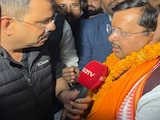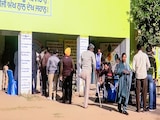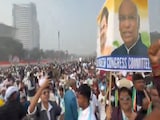Pakistan's election commission on Monday rejected a resolution passed by the Senate earlier this month seeking a delay in the February 8 general election, stating that all arrangements have been completed and it won't be "advisable" to put off the planned polls.
On January 5, the upper House of Parliament passed a non-binding resolution seeking a delay in the general election, citing cold weather and security concerns, increasing the political uncertainty in the country.
The resolution, tabled by independent Senator Dilawar Khan, received overwhelming support in the Senate but was slammed as "unconstitutional" by major political parties. It was passed with only 14 lawmakers out of the Senate's 100 members in attendance.
In the statement on Monday, the Election Commission of Pakistan (ECP) said that it deliberated on the resolution and observed that caretaker federal and provincial governments had been issued directions for increased "security matrix" and providing a "congenial environment to the electorate" for peaceful elections.
The top electoral body said it had made all the necessary arrangements regarding the conduct of general elections, adding that it had also submitted a commitment to the Supreme Court to hold elections on February 8, 2024, the Dawn newspaper reported.
"Likewise, It would not be out of place to mention here that in the past, general elections and local government elections have been held in (the) winter season," it said.
The letter said that it would not be "advisable" for the Election Commission of Pakistan to postpone general elections "at this stage", according to the report.
Meanwhile, lawmaker Mr Khan wrote a letter to Senate Chairman Sadiq Sanjrani on Monday, saying that it was "disconcerting" that no "tangible steps" had been taken by the election commission to delay the general elections despite the passage of the resolution tabled by him in the Parliament's upper House.
Asserting that the resolution "aptly reflected the collective aspirations of the House", Mr Dilawar said, "However, despite the Senate's explicit urging and the subsequent dispatch of a copy of the resolution to the Election Commission of Pakistan, it is disconcerting that no tangible steps have been taken by the Election Commission of Pakistan to postpone the general elections scheduled for February 8." Mr Dilawar said that as the mover of the resolution, he "firmly believed" that the concerns articulated in the motion must be promptly addressed.
"It is imperative that we ascertain the progress made and ensure the postponement of the general elections scheduled for February 8, thereby facilitating the effective participation of people from all areas of Pakistan and across the entire political spectrum in the electioneering process," Mr Dilawar was quoted as saying by the report.
The non-binding resolution tabled by Mr Dilawar was rejected by major political parties, which stated that further deferring the electoral process would be "unconstitutional".
A counter resolution was submitted in the Senate by Senator Mushtaq Ahmed Khan, emphasising the need to adhere to "constitutional requirements" and ensure the timely conduct of the polls.
Meanwhile, the Pakistan Tehreek-e-Insaf and Pakistan Peoples Party (PPP) unanimously filed a requisition for the Senate session for timely polls last week.
Two similar resolutions seeking a delay in the general election were moved in Pakistan's Senate within a gap of two days on Friday and Sunday. These resolutions cited cold weather and security concerns for the postponement of the elections.
A resolution passed by the Senate has no legal authority to delay elections, but such documents have moral force and can be used in litigation as evidence of elected representatives.
(Except for the headline, this story has not been edited by NDTV staff and is published from a syndicated feed.)















